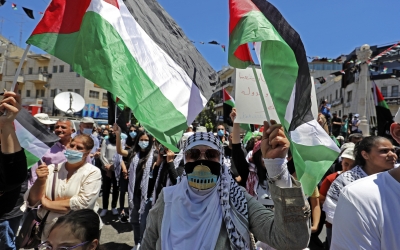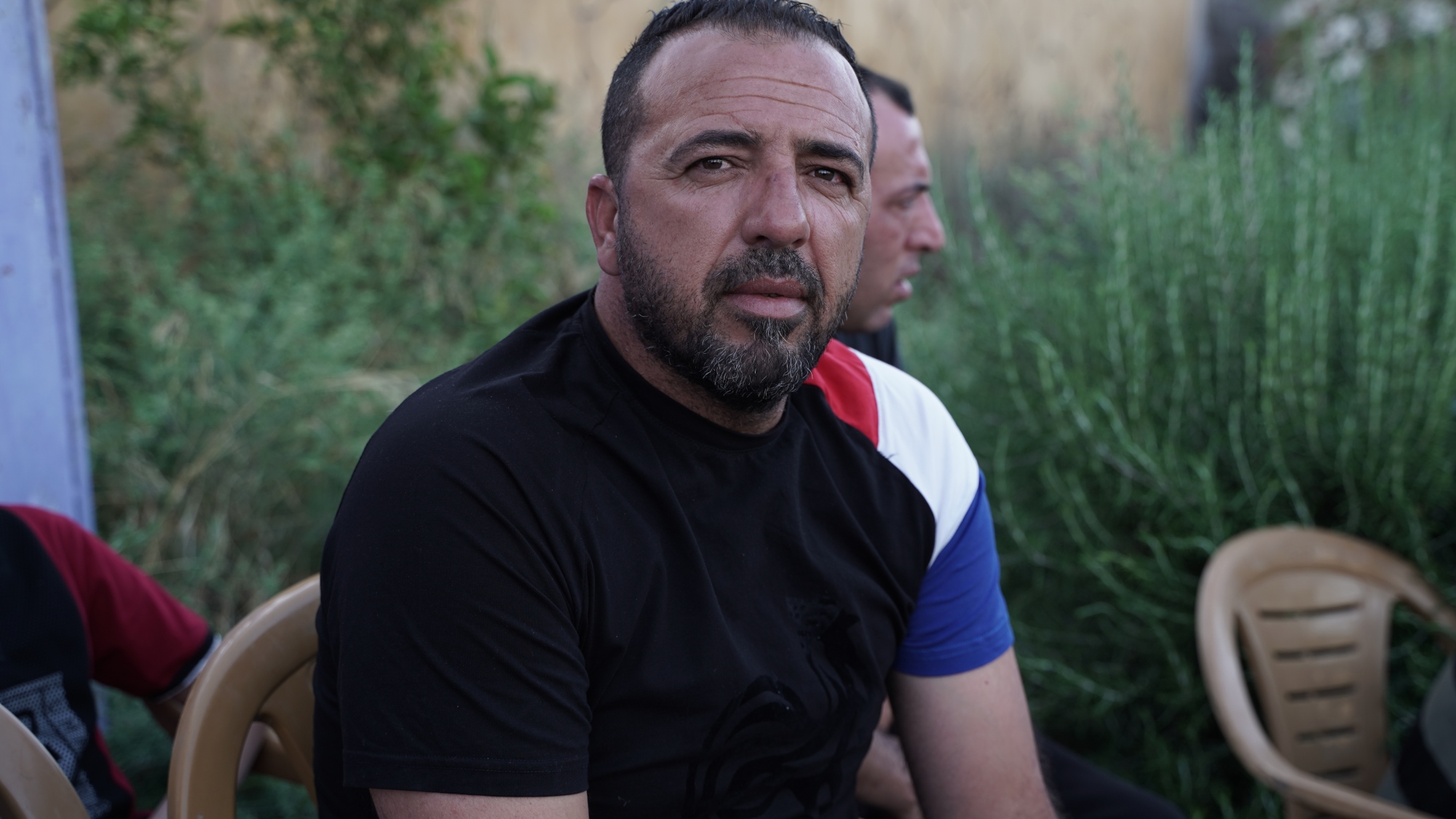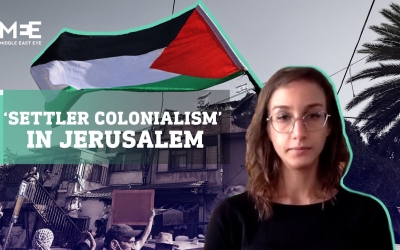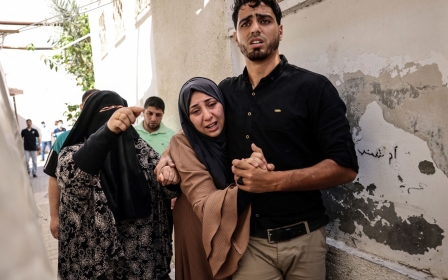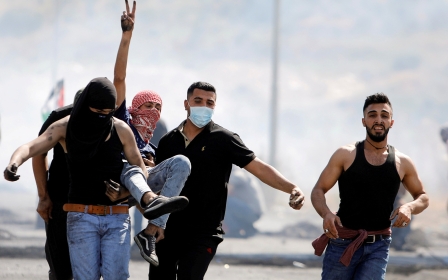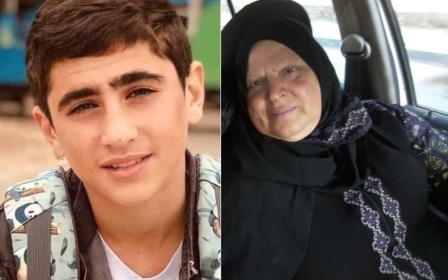Palestinian shot dead at West Bank checkpoint amid rise in Israeli killings
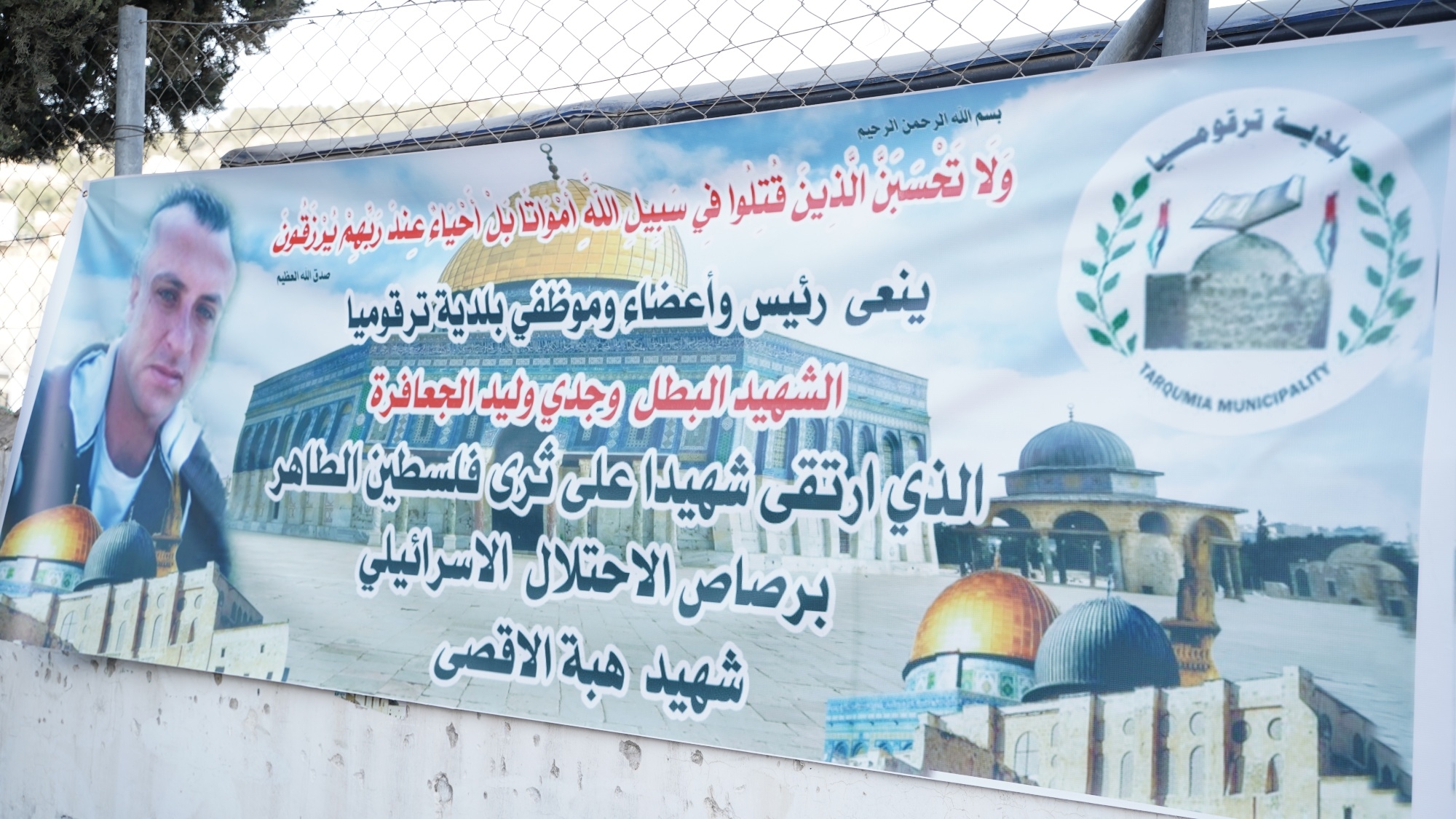
Wajdi Jaafra, 30, was on his way back home to the village of Tarqumiyah near Hebron in the southern occupied West Bank, after visiting his brother on Saturday night.
It was a long drive - about 30km - from his brother’s house in al-Dhahiriya, which sits right at the southernmost tip of the West Bank, back home. He had made it more than halfway when he called his wife, Warda, around 11pm to let her know that he would be home soon.
Just a few minutes later, he was shot and killed by Israeli forces near a permanent military checkpoint outside al-Fawwar refugee camp.
“We got a call from some of our friends in Fawwar who recognised Wajdi’s car, and told us that he had been shot,” Wajdi’s cousin, Rafat Jaafra, 40, told MEE on Sunday from the mourning tent set up in Tarqumiyah’s main square.
According to local media reports, the Israeli army claimed that Wajdi had tried to commit a car-ramming attack against soldiers stationed in the area. An Israeli army spokesperson did not return a request for comment from MEE by the time of publication.
Wajdi’s family rejected those claims, saying that it was late at night and he suddenly came upon a group of Israeli soldiers and settlers on the road and was “shot on sight”.
“Some of the eyewitnesses from the camp who saw what happened told us that there were groups of Israeli soldiers and settlers who were on the road when Wajdi came upon them,” Rafat recounted. “They said they didn’t even give him a chance to stop, they just started shooting.”
According to Rafat, Wajdi was shot five times, with bullets penetrating his chest, stomach and shoulder.
“When we saw his car, there were bullet holes everywhere, the glass on the front, back and sides of the car was all shattered, and there was blood everywhere,” he said.
“It was completely horrendous, how they killed him,” Rafat told MEE, as hundreds of mourners poured in from around the village to give their condolences to the family.
“They killed him without any warning and for no reason. We can’t believe it.”
‘They waited until they were 100 per cent sure he was dead’
According to Wajdi's family, Israeli forces provided no medical assistance after he was shot.
“Some of our cousins immediately went to the scene to go see what was happening, and confirm if it really was Wajdi who had been shot,” Rafat told MEE. “When they got there, Israeli forces wouldn’t let them or anyone through to go help Wajdi as he was lying on the ground bleeding.
“When some of them tried to get close and help Wajdi, the soldiers pointed their guns at them and threatened them,” he added.
According to Rafat, Wajdi was left lying on the ground bleeding for over an hour before anyone was allowed to approach his body.
“The bystanders told us he was still alive after they shot him. But the soldiers took him out [of the car] and left him to die on the ground,” he said.
Rafat added that Israeli forces on the scene did not provide Wajdi with any first aid, while also preventing Palestinian medics from accessing his body for over an hour.
“They waited until they were 100 per cent sure he was dead before they let anyone through,” he said. “When the Palestinian ambulance was finally able to get to his body, he was already dead.”
Wajdi Jaafra is one of 17 Palestinians to have been killed by Israeli gunfire in the West Bank between 10 and 16 May according to the United Nations Office for the Coordination of Humanitarian Affairs (OCHA), as demonstrations over Israel’s onslaught on Gaza and aggressions in Jerusalem have swept across the occupied territory.
The Palestinian Authority (PA) Ministry of Health has documented the killing of 21 Palestinians in the West Bank since 7 May, along with 3,728 wounded, according to a statement on Monday. The ministry noted that a significant number of the injuries it has documented - at least 441 - were the result of live ammunition.
Sharp rise in use of lethal force
Israeli forces have long been documented by rights groups as using excessive force against Palestinian protesters in the West Bank, as well as criticised for their “unjustified use of lethal force and execution” against Palestinians accused of allegedly committing attacks against Israeli forces.
But Palestinian activists say that in the past week and a half, as Israeli violations at al-Aqsa Mosque and in the neighbourhood of Sheikh Jarrah in occupied East Jerusalem sparked protests, they’ve noticed a sharp and sudden rise in the use of live ammunition and lethal force by the Israeli army in the West Bank.
'When you see the number of people who have been killed in recent weeks, you can see how aggressive they [Israeli forces] have become'
- Ghassan Daghlas, Palestinian activist
“Israeli forces have been employing an excessive use of live ammunition over the past week, as we’ve seen in the protests and also during night raids in the West Bank,” Ghassan Daghlas, a Palestinian activist with the Committee Against the Wall and Settlements in the northern West Bank district of Nablus, told MEE.
“When you see the number of people who have been killed in recent weeks, you can see how aggressive they [Israeli forces] have become,” he said.
This observation was corroborated by Israeli rights group B’Tselem, which told MEE that Friday “saw the highest number of Palestinian fatalities by Israel in the occupied West Bank in a single day since 2002”.
“Without the international community taking effective action to change Israel’s policies, Palestinians will continue to pay the unbearable price of living under Israel's apartheid regime,” B’Tselem added.
Rafat echoed similar sentiments, saying that what happened to his cousin “is related to what's happening all over Palestine”.
“There was no reason to kill him. He was just driving, and he came under fire from all directions,” he said. “This shouldn't happen.”
“As Palestinians, we are not safe in our own homes, in our cars, or in our towns. Everywhere around us there are armed settlers, and soldiers, and it's always tense,” he said. “It's gotten to the point where it’s not safe to leave our houses. You never know when you’re going to be shot and killed.”
Settler and state violence
In addition to an increase in the use of live ammunition on the part of Israeli forces over the past week, Palestinians say they’re coming under equally heavy attack from Israeli settlers, who live in the occupied Palestinian territories in violation of international law.
While ultra-nationalist Israeli mobs have carried out attacks on Palestinian citizens of Israel in recent days, dozens of cases of Israeli settler attacks on Palestinians and their property in the West Bank have also been reported by Palestinian media.
Instances of settlers setting fire to Palestinian lands, attacking Palestinian vehicles with rocks, blocking off roads leading to Palestinian towns and intimidating and attacking Palestinian drivers have all been reported in just the past few days.
In several cases, Israeli forces reportedly protected settlers and targeted Palestinians who were being attacked. In one case reported by official PA news agency Wafa, a group of settlers attacked Palestinian homes in the area of Masafer Yatta on 8 May; when Palestinian residents attempted to defend themselves, Israeli forces opened fire on them, injuring one Palestinian with live ammunition and seven others with rubber-coated steel bullets.
Of the 17 Palestinians who were killed in the past week, at least one was killed as the result of live fire from Israeli settlers. Locals from the Salfit-area village of Iskaka told MEE that 24-year-old Awad Harb was killed when settlers opened fire on a group of youths in the village.
“The soldiers started shooting tear gas at us and live bullets, and when medics tried to reach Awad after he was shot, the soldiers prevented the ambulance from entering the village,” Raje Harb, Awad’s cousin, told MEE.
'Like a mafia'
According to Rafat Jaafra, there were several armed settlers near al-Fawwar when his cousin came under fire on Saturday night. He said that some eyewitnesses saw the settlers shooting towards Wajdi's car, alongside the soldiers.
“We don’t know if it was the settlers’ bullets or the soldiers’ bullets that killed him, but we know the settlers have been out for blood recently,” he said, adding that residents in Tarqumiyah and the areas surrounding Hebron have noticed an increase in settler attacks in recent weeks.
'We are all afraid these days, because if you come face to face with the settlers, they have no mercy'
- Rafat Jaafra, cousin of slain Wajdi Jaafra
“Just today, the settlers on the main road outside Hebron were stationed on the road like a mafia, carrying their guns and stopping Palestinian cars to harass us, pointing their guns at us,” he said, adding that soldiers were also stationed in the area.
“We are all afraid these days, because if you come face to face with the settlers, they have no mercy. They’ll break your car, attack your home, and even try to kill you,” he said.
Daghlas said that activists like him are seeing new settler attacks in the West Bank “every few hours”, and that “the settlers and soldiers are shooting to kill”.
“Right now, the settlers are more aggressive and they’re more emboldened by what they’re seeing in ‘48,” he said, referring to the right-wing attacks on Palestinians inside Israel.
“(Israeli Prime Minister Benjamin) Netanyahu has given the green light for the soldiers and the settlers to attack Palestinians without consequence,” he said. “The soldiers and settlers are working hand in hand to kill Palestinians.”
Middle East Eye delivers independent and unrivalled coverage and analysis of the Middle East, North Africa and beyond. To learn more about republishing this content and the associated fees, please fill out this form. More about MEE can be found here.


